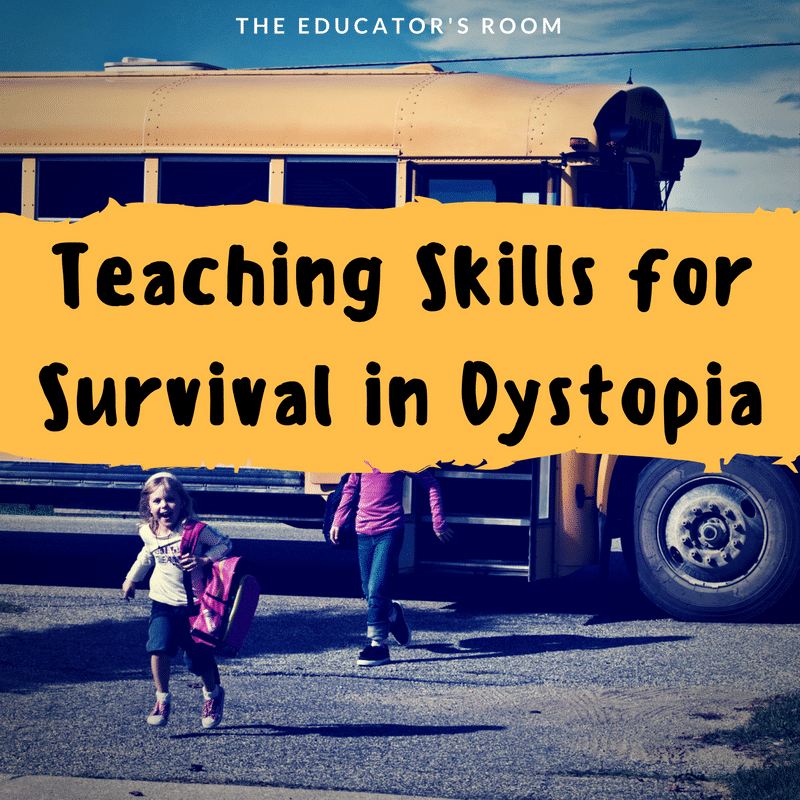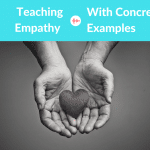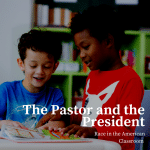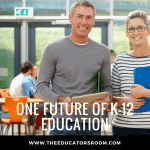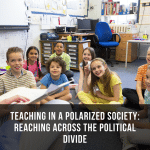Skill #1: Radical Imagination
Welcome to Dystopia
Last week I presented an argument. We should teach kids to value diversity and to speak up against bias, hate, and bullying. I thought it was a pretty innocuous idea. But by leading my post with a list of factual statements and actions taken by President-elect Donald Trump which have promoted bias, hate, and bullying, I was accused of perpetrating bias myself.
Welcome to dystopia, that is to say, America, in 2016. In this world, it is biased to point out bias. It is racist to point out racism. It is divisive to point out divisiveness.
Unfortunately, this kind of Orwellian logic, where words lose their inherent meaning is only one part of life in Trump’s America. Putting aside his conflicts of interest, nepotism, and lying, there is the very real, very scary possibility that we are entering life in an autocratic regime.
I’m not the only one who has concerns about what impact this will have on the children we teach. Emily Kaplan writes:
“Imagination, the specialty of children, is our most fundamental freedom. If it is destroyed, so goes our civilization.
This, then, is our task: to cultivate in our children the ability to cope without growing accustomed, to plant seeds for the future in a warped and barren present. For the next four years or more, our children must survive in the desert while learning to believe in snow.”
There has been a conversation recently about the need to avoid “normalizing” Donald Trump, his presidency, and the alt-right/white supremacist movement he has emboldened. As Kaplan points out in her piece, children are the most vulnerable to this normalization. They will assume that the world they live in is the world as it’s always been, and will always be. We must teach them otherwise.
[bctt tweet=”children are the most vulnerable to this normalization” username=”EducatorsRoom”]
What does radical imagination look like?
When I think of radical imagination, I think simply of the ability to imagine entirely new possibilities. It crystallized for me when a friend shared a quote by the late professor and author Oren Harari: “The electric light did not come from the continuous improvement of candles.”
Yes, revising and tinkering are useful skills. They allow for continuous progress in pursuit of excellence.
But, it feels that we are overly reliant on these skills in schools, while we are under-utilizing imagination. When we limit what we think is possible, we limit our ability to be change the world. That is why radical imagination is often discussed in many of today’s progressive social movements. It’s the difference between fighting for reform, and fighting for outright liberation.
We need our students to believe in and envision limitless possibility and freedom. This is important for our marginalized students: our students of color, Muslim students, LGBT students, and students with disabilities. And we need this for white students who are watching Trump, and internalizing hateful and harmful ideas.
Ultimately, radical imagination allows us to envision freedom for all. This is essential in a time where so many members of our community are fearful and anxious.
[bctt tweet=”We need our students to believe in limitless possibility and freedom.” username=”EducatorsRoom”]
How do we teach radical imagination?
I’d like teachers to start by using radical imagination in the way they approach their classrooms and students, because as always, teaching begins with modeling. Do we really feel like these Pearson and Harcourt materials are the best we can provide our students? What would you do with your students if there were no limitations? What would you teach them? Where would they go? Who would you want them to meet?
When teaching radical imagination, it’s easy to find a fit with every discipline. Any subject can cultivate and benefit from radical imaginative thinking. I’d love to see my students imagine new worlds and communities in their art and writing that include and value all human life. I’d love to see my students use science and engineering to design robots that combat pollution or even bullying.
Social justice is ultimately about envisioning and creating a world that has never existed. To incorporate social justice into our teaching then, is not just about looking at the history of Native American genocide or heroes of the Civil Rights movement. It is also about developing a sense of hope. It is about allowing students to see the world freed from the constraints of oppression. As we head into four years of more governed by fear, hate, and divisiveness, I can’t imagine a more important time to teach these skills.
